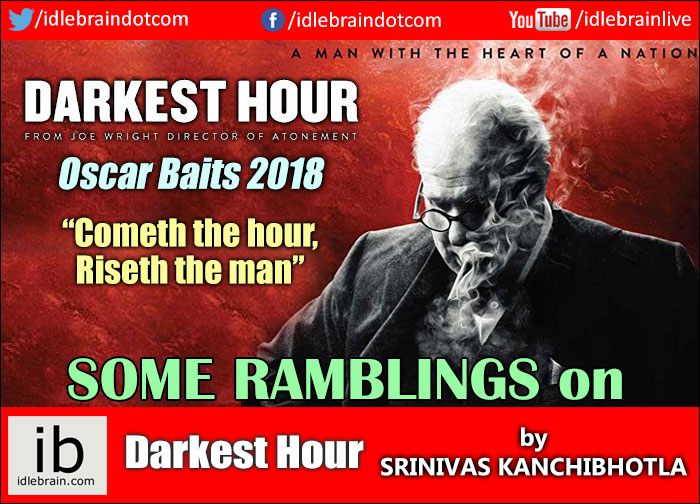
What is leadership afterall but stringing stirring words together inspiring peolpe in action. A leader can be immobile himself, relegated to a wheelchair, and yet has all the power in his words to move his followers across land, seas and air. A leader can be the least bit inspiring himself physically, and yet has enough conviction and motivation in his words to have men much stronger and mightier spring into action and do the unthinkable. A leader is not by thought or deed, he is is all by word. A cursory glance at history would reveal that the majority of men who stood in the path of the status quo and changed its course, for better or worse, used their words much more than their swords to make it happen. One needn't look past the longest poem ever written, the Mahabharata, where it was Krishna's words every step of the way that willed the fates and shaped the destinities of the kings and princes on either side of the battle lines. It is interesting to note that Krishna's character before and after the war appears the least bit inspiring (in Mahabharata, not in Bhagavata), but it is only when the war plans are drawn up that his character assumes importance delivering one of the most inspirational speeches ever committed to word. Even in the modern era, Hitler, Gandhi, Mao, Lenin, (and even the false preachers and propaganidists in the war ravaged nations in the present day Middle East inciting people into laying down their lives for some higher cause) each moved mountains from behind the microphones.
Can the most fervorous of words spur the troops to lay seiges and claim victories much more than the strategies drawn up battle chieftains in smoke filled war rooms or the commanders who take the battle by the scruff and guide their troops into achieving the near impossible? The power of words particularly in war scenarios is certainly debatable, but the impact that the right words from the right person with the right intentions at the right moments can never be undermined, because history remembers the key moments and turning points in wars not just by the winning strategies of the shrewd or the heroic deeds of the brave but also by the moving words of the wise which provide not just the inspiration or the motivation but most importantly, the necessary validation for their actions. "Four score and seven years ago our fathers brought forth on this continent...." starts the most famous speech in American history, "The Gettysburg Address" by Lincoln which justifying the taking up of the arms, brother against brother, in the American Civil war. "The only thing we have to fear is fear itself" delivered by the paralytic Franlin Roosevelt, brushed away the cob webs of complacence and inaction and committed the country to the second world war. (On the contrary, the infamous Vietnam war had none of these words or speeches associated with it as the leaders couldn't find a way justifying their actions of sending troops to settle a score that mattered very little to them in the long run.) Along those lines, history records another famous speech "We shall fight on the beaches" delivered by Winston Churchill to the House of Commons as the moment the pall over the crown finally lifted in the island nation turning the tide ever so slowly in its favor. "He mobilised the English language and sent it to battle" commented the famous broadcaster Edward R Murrow about Churchill's passionate appeal with a call to action for a war that was all but lost.
"Darkest Hour" is the run up to that famous speech by Churchill told from his perspective. History recreation part aside, this is a monumental acting achievement by Gary Oldman, who not just inhabits the character, but in fact transforms into one, both from physical and physiological perspectives. As a curmudgeon who is ill-adjusted to his surroundings, Oldman shines through his cantankerous portrayal of one of most controversial figures in modern history, whose singlehandedly rallied the public opinion for the war by standing up against the old guard, who were bent on taking the path of least resistance. The choice of siting the script in the lead up moments of the Dunkirk evacuation (much like how Speilberg's 'Lincoln' was a take on the President's finest moments in getting his emanicipation amendment pass through a deeply divided Congress) appears a wise one, as, a la Krishna in Kurukshetra, Churchill's true combative spirit shines bright (or works) only in those brief years of his ascencion to the highest office, with everything before and after relegated to the afternotes of his otherwise checkered political life. His peers hated him, his staff disliked him, his bosses (both in the palace, and in the Parliament) couldn't stand his very being, he was a very well reviled and prickly personality all his life. And from that position, to turn it around and rise to an ocassion that required a tough talk and a hard stance, Churchill may be not a man of all seasons, but when it truly mattered, he didn't mind being the man on the burning deck turning one of the darkest hours in the british history into his finest moment.
checkout http://kanchib.blogspot.com for Srinivas's Blog.
